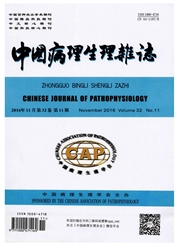

 中文摘要:
中文摘要:
正常人体肠道内寄生着种类繁多、数量庞大的微生物,以细菌为主,统称为肠道菌群。据统计其种类大于1000种,总数高达1014,是人体细胞总和的10倍[1]。正常情况下,肠道内的微生物与宿主相互依存彼此制约,共同维持动态的生物平衡。一旦外界环境或内在平衡受到破坏,肠道菌群种类、数量及比例等发生改变,造成肠道内菌群失调[2]。研究发现肠道菌群的失调与生物钟紊乱有着不可分割错综复杂的关系,彼此影响,给机体带来一系列病理生理改变。
 英文摘要:
英文摘要:
The human gut harbours a certain quantity and variety of microbes called intestinal flora, which is in a state of balance under normal circumstances, and dysbacteriosis occurs when the balance of the intestinal flora is dis-turbed by the host and the changes of the external environment.Circadian clock is the biological regulation system to adapt to natural circadian rhythm, including central clock and peripheral clock.Circadian clock disturbance, particularly rotating shift-workers with irregular light-night schedules, is associated with an increased risk of immune-related diseases.The de-velopment of these diseases is closely related to intestinal dysbacteriosis.Therefore, the correlation between intestinal dys-bacteriosis and circadian clock disturbance has attracted much attention.This review aims to explore the pathophysiological basis of the development in some immune-related diseases based on the latest scientific findings about the relationship be-tween intestinal microbial flora and circadian clock.
 同期刊论文项目
同期刊论文项目
 同项目期刊论文
同项目期刊论文
 期刊信息
期刊信息
